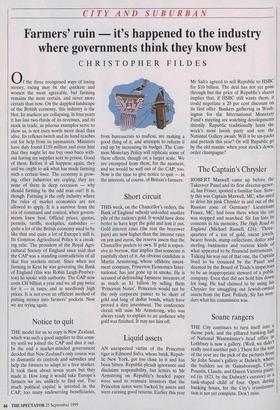CITY AND SUBURBAN
Farmers' ruin it's happened to the industry where governments think they know best
CHRISTOPHER FILDES
Of the three recognised ways of losing money, racing may be the quickest and women the most agreeable, but farming remains the most certain, and never more certain than now. On the dappled landscape of the British economy, this industry is the blot. Its markets are collapsing, in four years it has lost two-thirds of its revenues, and its stock in trade, as piteous examples serve to show us, is not even worth more dead than alive. Its reflexes twitch and its hand reaches out for help from its paymasters. Ministers have duly found £150 million and even hint that they might let me buy osso buco with- out having my supplier sent to prison. Good of them. Before it all happens again, they and we ought to ask what has made farming such a certain loser. The economy is grow- ing, other industries are coping, they are none of them in deep recession — why should farming be the odd man out? It is, though. Farming is the only industry where the rules of market economics are not allowed to apply. It is a survivor from the era of command and control, when govern- ments knew best. Official prices, quotas, permits, tariffs, stockpiles, susbsidies quite a lot of the British economy used to be like that and quite a lot of Europe's still is. Its Common Agricultural Policy is a creak- ing relic. The president of the Royal Agri- cultural Society of England once said that the CAP was a standing contradiction of all that free markets meant. Since when not farming in Kent he was governing the Bank of England (this was Robin Leigh-Pember- ton) he spoke with authority. The CAP now costs £30 billion a year and we all pay twice for it — in taxes, and in needlessly high prices. It is not even an efficient method of putting money into farmers' pockets. Now we are trying again.


























































































 Previous page
Previous page